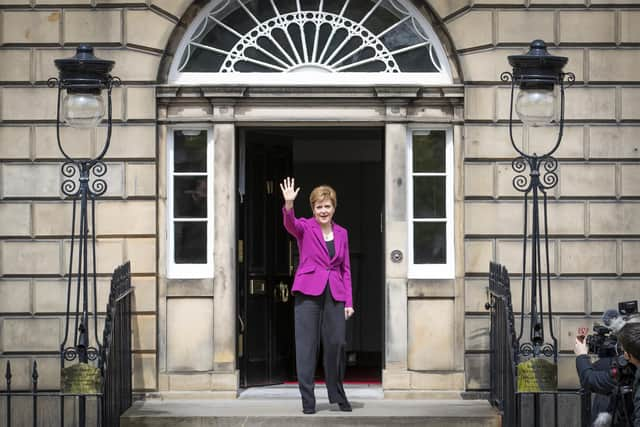Scottish independence: Second referendum talk is all the rage but it won't happen any time soon – Ian Swanson
Let us know what you think and join the conversation at the bottom of this article.
It’s not because Nicola Sturgeon fell one seat short of an absolute majority – the system is designed to make it very difficult for any one party to achieve that and, thanks to the Greens, there is in any case the same pro-independence majority as there was in 2011 when the first referendum was agreed.
And it’s not just because Boris Johnson has made clear he will refuse a Section 30 order transferring the necessary powers to Holyrood whenever Ms Sturgeon asks for it.
Advertisement
Hide AdAdvertisement
Hide AdThe first reason there will be no early vote on Scotland’s constitutional future is that, despite the campaign claims of opponents, there was never going to be one “in the middle of a global pandemic” and the First Minister said so repeatedly.
But secondly, Covid aside, she is in no rush to hold Indyref2 because the evidence of the polls suggests she might well lose.
Ahead of polling day, there was speculation that turnout in the election could fall below 50 per cent and warnings that such lack of interest would negate any mandate the SNP might claim for a fresh referendum even if it did secure an outright majority.


But in the event a higher percentage of people voted this time than in any previous Scottish Parliament election. In Edinburgh some seats saw turnout jump by seven points.
That suggests a welcome level of engagement and is good for democracy.
But it also carries echoes of the 2014 independence referendum and even the 2016 UK Brexit referendum which saw record turnouts and highly polarised positions as large numbers of people came out to vote because they felt so passionately in favour of one side or the other.
For a long time, opinion polls in Scotland showed little movement on the referendum’s 55:45 split for Scotland staying in the UK, then from about the middle of last year the polls shifted decisively in favour of independence, but now that has fallen back again to roughly 50:50.
And comparing the vote share of pro- and anti-independence parties, the election result confirms a nation split down the middle.
Advertisement
Hide AdAdvertisement
Hide AdThere are those in the nationalist movement who want to press ahead with a referendum as soon as possible. Ms Sturgeon says she wants it in the first half of this parliamentary term, but it seems unlikely she would choose to hold it unless the polls are more encouraging.
Her predecessor Alex Salmond claims she is too cautious and has accused her of losing her nerve over independence. But the failure of his Alba party and its call for immediate independence negotiations, together with the SNP’s success in securing a record vote share and a near-majority, mean some of the pressure for quick action is off for now.
The party also needs time to revise its case for an independent Scotland. Brexit and Covid mean the situation has changed dramatically since 2014 and much of what was said then is now obsolete. Big questions need to be answered on currency, membership of the EU, borders with the rest of the UK and much more.
So there will be no referendum imminently – but the arguments will rage nevertheless.
A message from the Editor:
Thank you for reading this article. We're more reliant on your support than ever as the shift in consumer habits brought about by coronavirus impacts our advertisers.
If you haven't already, please consider supporting our trusted, fact-checked journalism by taking out a digital subscription.
Comments
Want to join the conversation? Please or to comment on this article.
